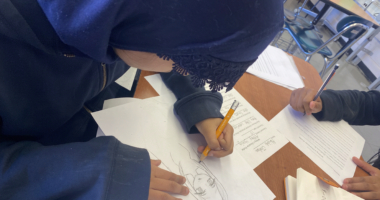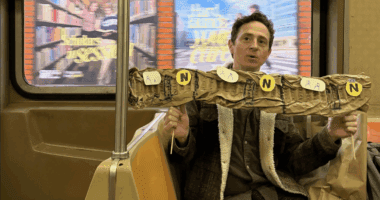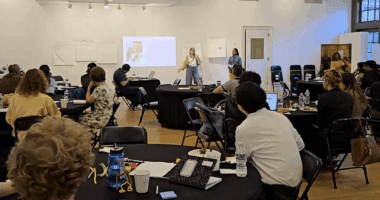“I always imagined Paradise would be some sort of a Library.”
–Jorge Luis Borges, Argentine short-story writer, essayist, poet and translator.
It is rainy, cold, and windy in New York City. It seems the weather matches the unsettling – yet vigorous and resolute – spirit of these times. This January, all at once, everything has become bold and urgent. The present circumstances have forced us to rise from a comfortable slumber. The structure of this house, its general décor, and decorum, have been inevitably altered. Therefore, we who aspire to be effective co-participants in this country’s development, we that communicate through the Arts, we that aspire to communicate with children, invite young people into a wondrous, critical, poetic, courageous, participatory life journey. We who seek to share the endless motifs of creativity, resilience, dignity, and altruism, must show up, be present, be our best Selves, now. We must lean towards beauty, optimism, and hard work. Lean towards love, joy, and fraternal co-existence. We must shine and, by word and deed, transform that which we cannot accept.
My family came to the United States when I was still a child. I was two and my little brother was eleven months old. Here, in New York, as well as in Los Angeles, I gathered my first collection of images, scents, sounds and feelings. I developed my first conscious notions of friendship, family, longing, school, fun, community, art, and journeys. These were all born here: in the Northern tip of a continent which also has a South. Funny, I never thought of it as two different places. America, to me as a child, was a single enormous Sequoia, a whole gigantic Ceiba, through which I moved from root to branch with enjoyment and awe of each and every part of its magnificence.
Now, as an adult, I continue to travel from North to South, from root to tip, gathering stories, landscapes, songs, little gold pebbles that will illuminate a young mind, sweet melodies that might restore an unsettled heart. I collect recitations of the names of plants: Araucaria, Quinoa, Amaranta, Uchuva, Verdolaga, names that sound ancient, windy, vast, worthy of trust…
Once upon a time, in the southern lands of this continent, America, lived a boy. His name was Jose Gutierrez and he was born in Colombia, a country with a spine made out of mountains, tall, magnificent, rich mountains that were green at dawn and blue at dusk. The Andes was their name.
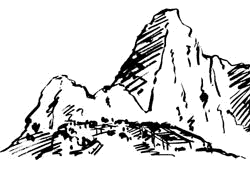
Jose’s mother was a homemaker and a peasant with a second grade education and his father was a construction worker who hadn’t finished third. They struggled day by day to bring food to the table and clothing to each one of their children. Despite these setbacks, some of Jose’s dearest childhood memories were with his family in his home. Jose recalls his mother gathering all the children in a circle, and reading the books El gato con botas (Puss n’Boots), Simon el Bobito (Simon the Fool), and Ivan el mentiroso (Ivan the Liar). All at once, the stories would enter the humble room, create universes never before seen, state a clever statement, tip a hat, adorn a phrase, and the cracked walls would shine, and the tired limbs were at once restored, and hunger would dissipate, as if in a dream.
As a ten-year-old, Jose was forced to work with his father on the construction site. While there, he once spotted a bookcase that had been left amongst debris. He saw one book with a beautiful leather cover and was immediately drawn to it. He decided to take it home. This book would change his life forever. The title was “On the Human Search for Meaning.” It was written by Austrian Holocaust survivor, Viktor Frankl. From this point on, Jose the Andean boy, continents apart from Frankl’s old Europe, incessantly cultivated his fascination with literature. He became a regular at libraries, learned bookstores’ phone numbers and addresses by heart, and rarely ceased to read. Although, due to poverty, he did not complete his high school studies, the seed that his mother had planted, and Serendipity’s kind hand, lead him on his quest to knowledge and fueled his fascination with learning.
Jose was forced into all sorts of odd jobs, and, one day, while working at a car wash, he decided to ask one of his customers about a book he had heard of, La Odisea, Homer’s Odyssey. The client said that if he had just one book to choose in life, that would be the one. That evening, Jose spent his earnings on this famous Odyssey, and the dream of Ithaca became his Northern star. Years later, he worked night shift as a sanitation worker and drove a big truck from 10:00pm to 4:00am. Imagine driving all night long and picking up trash, that which the City has disdained, that which has been deemed of no use, that which is expendable. Yet the boy, now a man, who wasn’t born under a bright star has, amongst the rubble, his precious treasure: books.
Now, Jose is married and has two children. His family knows of his delirium, and, amorously, though with a tad of reserve, they endure it. The fact that life has presented him with these goods, these jewels amongst the shipwreck, must mean something, he says to himself. So, he collects them all, the wise sailor that he is, and starts to bring them home, forming the Library of his dreams. He has cooking books, gardening and astrology amongst plastic and Styrofoam, fancy Bibles, a Koran, The Colombian Constitution, Neruda mixed with stale bread and broken hangers, Pombo, Stendhal, books in French, a Greek dictionary amidst wine bottles and soda, a typing method, and a book that he cherishes and quotes: Tolstoy’s Ana Karenina.
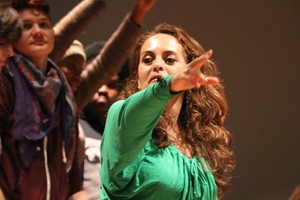
Very soon, in Ciudad Bolivar, his neighborhood, one of the poor settlements in the southern part of Bogota, people will start to call him “El Sen~or de los libros,” The Book man. Children will gather upon his truck’s arrival, curious and gleeful, as if a sudden miracle were about to occur. His wife’s sewing room will disappear, giving way to shelves and shelves of paper stories, of ink thoughts and awkward forms that signify and make you ponder. His children’s rooms will be invaded by authors that they don’t yet know. People, by word of mouth, will come to know of our good man’s mission and decide to chip in. From the most unexpected places, people will start to donate books, marvelous books, useful books, wondrous ones, and Jose’s wife, Luz Mary, will become the official librarian of their new Alexandria.
Jose decides to become a traveling book man. He brings books to the most remote regions of Colombia, where for years, only guerilla and paramilitary have reigned, and where children have only been able to read the bits of newspaper used to wrap the vegetables and fruit bought at the local market. He will travel six hours to Monterrey and Casanare to deliver school books, drive to Sumapaz and Huila on treacherous roads, content just to see the children’s faces: the beauty of his mother’s offerings, time traveling, recovered at will.
This man, once a boy, was able to overcome adversity thanks to words spoken, words woven with love, thanks to universes that opened up to him at the turn of a page. Jose Gutierrez, The Book man, has traveled the world. He was invited to speak in Guadalajara at a Writers Symposium in 2010 and spoke about literature, marginality and poverty. He received grants from Norway, France, and Spain to fund his project of filling the country with libraries. His foundation “El poder de la Palabra” (The Power of Words), intends to create a Book Bank, a Book Warehouse and a Press. He would like to read, he says, until he dies, or goes mad.
North and South, all over the continent, there are children awaiting to see, to hear, to feel something that will adjust the sometimes faulty lens that has been handed to them. Teaching is but a clear remembrance of love, carried unspoiled through time and space. It is a warm memory of sharing, marvel, and discovery. May we be brave and worthy sailors, may our own Ithacas, as that of Odysseus, endure the test of time, and forever live in our hearts.
– Vivian A. Regueros, 2016-17 TATIP Trainee

